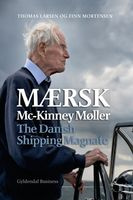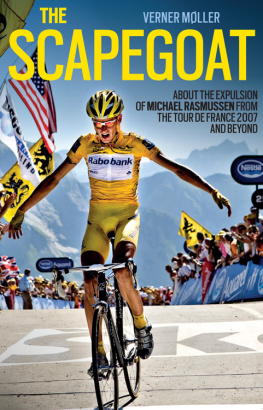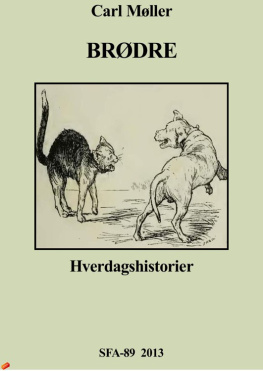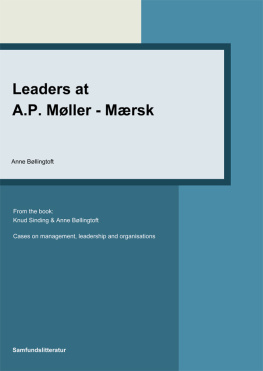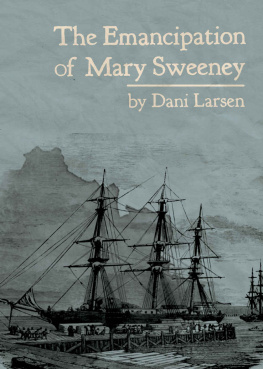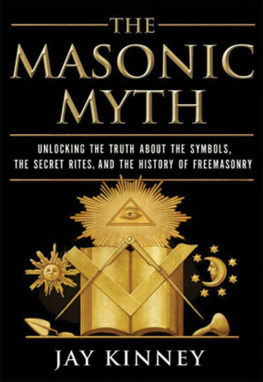Larsen Thomas - Mærsk Mc-Kinney Møller: The Danish Shipping Magnate
Here you can read online Larsen Thomas - Mærsk Mc-Kinney Møller: The Danish Shipping Magnate full text of the book (entire story) in english for free. Download pdf and epub, get meaning, cover and reviews about this ebook. City: Gyldendal Business, year: 2011, publisher: Gyldendal Business,, genre: Politics. Description of the work, (preface) as well as reviews are available. Best literature library LitArk.com created for fans of good reading and offers a wide selection of genres:
Romance novel
Science fiction
Adventure
Detective
Science
History
Home and family
Prose
Art
Politics
Computer
Non-fiction
Religion
Business
Children
Humor
Choose a favorite category and find really read worthwhile books. Enjoy immersion in the world of imagination, feel the emotions of the characters or learn something new for yourself, make an fascinating discovery.

- Book:Mærsk Mc-Kinney Møller: The Danish Shipping Magnate
- Author:
- Publisher:Gyldendal Business,
- Genre:
- Year:2011
- City:Gyldendal Business
- Rating:4 / 5
- Favourites:Add to favourites
- Your mark:
- 80
- 1
- 2
- 3
- 4
- 5
Mærsk Mc-Kinney Møller: The Danish Shipping Magnate: summary, description and annotation
We offer to read an annotation, description, summary or preface (depends on what the author of the book "Mærsk Mc-Kinney Møller: The Danish Shipping Magnate" wrote himself). If you haven't found the necessary information about the book — write in the comments, we will try to find it.
Mærsk Mc-Kinney Møller: The Danish Shipping Magnate — read online for free the complete book (whole text) full work
Below is the text of the book, divided by pages. System saving the place of the last page read, allows you to conveniently read the book "Mærsk Mc-Kinney Møller: The Danish Shipping Magnate" online for free, without having to search again every time where you left off. Put a bookmark, and you can go to the page where you finished reading at any time.
Font size:
Interval:
Bookmark:

Thomas Larsen and Finn Mortensen
The Danish Shipping Magnate
Mrsk Mc-Kinney Mller a personal portrait in interviews
Gyldendal Business
Preface
Mrsk Mc-Kinney Mller is one of a kind within the Danish business community. Celebrated, much criticized, shy and shrouded in myth. Most Danes know the myth of Mller, but very few know the man behind the myth. The few who do know him have not wished to share their personal relationship with Denmarks greatest businessman with others - until now.
A man with so much power, influence and charisma as Mrsk Mc-Kinney Mller could easily become lonely. Responsibility for huge and significant decisions cannot be shared, and the risk of being surrounded by yes-men who only want to please is great. This he knows. Therefore, over the years he has surrounded himself with a few close confidants who have dared to challenge his strong will and opinions, dared to disagree and offered alternative points of views and solutions. Mrsk Mc-Kinney Mller has people of this calibre among his closest friends, advisers and family.
This book is not a story about a global company with over 110,000 employees in over 125 countries. Instead, it paints a personal portrait of the senior shipowner at Esplanaden, by the people who know him best. These people belong to his exclusive inner circle. What is characteristic of their conversations, which form the basis of this book, is that everyone has chosen to talk openly and frankly about Mrsk, as they know him - professionally and privately. They shed light on a man, whose achievements by virtue of his exceptional commercial talent, a strong will, and a legacy of a lifelong sense of duty inherited from his father, A.P. Mller, are world-renowned.
For more than half a century, Mrsk Mc-Kinney Mller has not only been the figurehead of the Danish shipping world, but also worldwide. Since 1965, he has been the front figure for Denmarks most significant business, A.P. Mller - Mrsk. In this capacity, he has held executive board positions and served as an adviser for some of the worlds largest corporations, including the IBM Corporation in the USA.
He is currently the only living civilian Danish Knight of the Order of the Elephant, the Danish monarchys highest recognition, which is normally only awarded to members of royal families and foreign heads of state. He has been awarded numerous foreign decorations and among others, in 1990 he received Britains finest order for foreigners, Honorary Knight of the British Empire. Ten years later, he was named Denmarks greatest businessman of the 20th century.
The capital wealth that A.P. Mller has built up over the decades has been used to create two foundations, which today are majority shareholders in the listed company. Year after year, one of the foundations, The A.P. Mller and Chastine Mc-Kinney Mller Foundation, has made donations to a wide variety of causes in Denmark and Germany, with the Opera House in Copenhagen being the most eye-catching bequest. Recently, with the construction of a new high school for the Danish minority in South Schleswig costing Dkr 400 million, he has again shown his great interest in the region.
However, to say that he has only received praise for his efforts would not be true. Very often, he has been the subject of harsh criticism, and if one looks at his toughest confrontations with the press, politicians and the public, they have mainly been about the protracted renegotiation of the oil and gas concessions, which has given the company access to the natural resources under the Danish part of the North Sea. Mrsk Mc-Kinney Mller was initially opposed to the company going into oil exploration, but bowed to his fathers will and subsequently turned the oil and gas side of the business into a resounding success. Since then, the political majority at Christiansborg, the Danish Parliament, had insisted on renegotiating the original agreements, which in Mrsk Mc-Kinney Mllers world was a breach of promise, and he reacted with disappointment and anger.
For Mrsk Mc-Kinney Mller the most painful criticism was not in fact directed against himself, but against his father. In recent years, journalists and historians have investigated the role of the Danish business world during the Second World War, and journalists from the Danish newspaper Berlingske Tidende persistently held the disapproving magnifying glass over A.P. Mller. Their articles wounded Mrsk Mc-Kinney Mller so deeply that he put his shares in Berlingske Media up for sale. Thus, he turned his back on a newspaper that several years prior he had helped to save from closure. Along the way, Mrsk Mc-Kinney Mller has had to accept that the spirit of the time was against him. Like his father, he is a man with basic middle class attitudes and values enshrined in God, king and country. He is a staunch supporter of the Danish royal family, and he has participated in networks and organisations to strengthen the Danish Armed Forces. Even his role as a patron has been controversial. Public reaction to both the construction of Amalie Garden and the Opera House in Copenhagen was often highly emotional, and his critics have accused him of dictating rather than donating gifts.
Other criticism has been aimed at the operation of the business. Under Mrsk Mc-Kinney Mllers management the company has secured a unique position in China, which despite reforms is far from being a democracy, just as it is a fact that human rights are violated in the country. Like many other international companies, A.P. Mller - Mrsk has chosen to speculate that increased trade, combined with discreet dialogue will in turn bring about improvements and changes, while critics believe that large companies should be much more direct and proactive.
Over the years, some of the criticism was justified, but it is also clear that Mrsk Mc-Kinney Mller personally and the company A.P. Mller - Mrsk are cloaked in a typical Danish ambiguity. Most Danes are certainly proud to see the companys blue ships with the white star under foreign skies, and they place Mrsk at the top of the list of the nations most admired sons, but it lies deep within Danish national sentiment that no one should be too great. Therefore, it is not an advantage to be a big fish in a small pond. The journalist and author Paul Hammerich exemplified this point when he wrote that Denmark is a country where a few have too much and fewer have stature. Mrsk Mc-Kinney Mller has stature. He stands up and makes a difference.
The reason it was possible to write this book is due to Mrsk Mc-Kinney Mller finally accepting that the book needed to be realised. Initially he was opposed to it. Just as it happened to countless other journalists and writers, we too received a polite, but firm refusal when we first presented the idea of the book to him. Mrsk Mc-Kinney Mller emphasised that he had no wish to be exposed.
Still to this day we do not know the exact reason why he let himself be persuaded, so we can only guess. Mrsk Mc-Kinney Mller has no need to take stock and boast of his accomplishments. Even at his grand old age, he is looking ahead and anticipating the next challenges. However, it has long been a heartfelt wish among his nearest and dearest that the story of the businessman and the man Mrsk should be told. They have a powerful argument, which presumably made an impression. Mrsk Mc-Kinney Mller enjoys reading about people who can inspire and provide the stuff of dreams, and when he finally accepted that we would begin writing this book, it was probably due to his desire to share and pass on some of his experiences and adventures to inspire others.
Thomas Larsen and Finn Mortensen
Copenhagen, June 2011
Next pageFont size:
Interval:
Bookmark:
Similar books «Mærsk Mc-Kinney Møller: The Danish Shipping Magnate»
Look at similar books to Mærsk Mc-Kinney Møller: The Danish Shipping Magnate. We have selected literature similar in name and meaning in the hope of providing readers with more options to find new, interesting, not yet read works.
Discussion, reviews of the book Mærsk Mc-Kinney Møller: The Danish Shipping Magnate and just readers' own opinions. Leave your comments, write what you think about the work, its meaning or the main characters. Specify what exactly you liked and what you didn't like, and why you think so.



